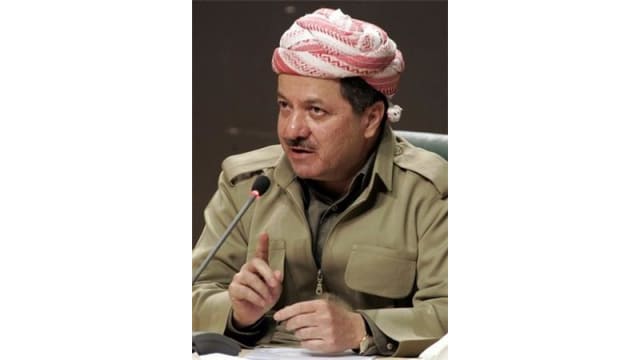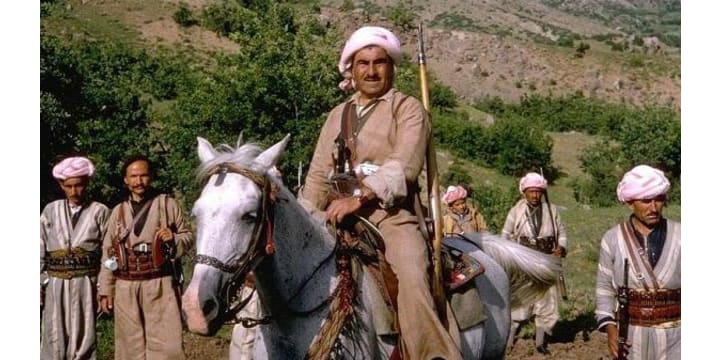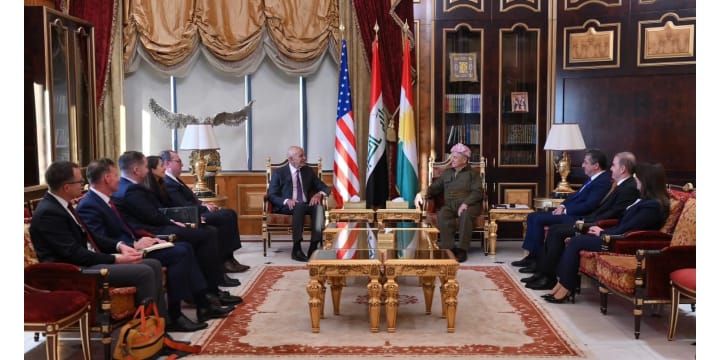
President Barzani: Without a doubt, after all these sacrifices how can we retreat? Kurdistan must be in a better position
Transcript of Al Jazeera television interview by Ahmed Zaoui with HE President Massoud Barzani of Kurdistan Region,
Al Jazeera: Mr President, as you are the first supreme commander of the armed forces in Iraqi Kurdistan, how do you assess the situation on the status of the combat with Peshmerga battling against militants beyond a thousand kilometres?
President Barzani: Thankfully Peshmerga forces managed to recover most of the areas that were under Islamic State (ISIS) terrorist control, however, it is very clear that the situation in IS areas are in decline and declining continuously.
Al Jazeera: Can we consider that the risk of state regulation has strayed away from the Kurdistan Region? Especially if we know they were applied at the beginning of the campaign before Peshmerga took control?
President Barzani: They initially took advantage of some mistakes so to speak, but the matter was quickly rectified, and now the Peshmerga liberated most of the areas. I cannot say that the risk of IS has ended, it is true now though that they have less risk, but the risk still exists.
Al Jazeera: There are important areas such as Sinjar district, as well as parts of the Nineveh Plain that is important for the Kurdistan Region, are gunmen still state regulated as they control where there is no progress by the Peshmerga towards these areas? What’s the reason for that?
President Barzani: Half of Sinjar city is still under the control of terrorists, and some of the Nineveh Plain areas also, and the protection of these areas linked to the liberalization of other areas, so we are waiting for a more comprehensive plan, and will get to these areas also, God willing.
Al Jazeera: Will you get to these areas related to the timing or editorial related to the upcoming battle of Mosul?
President Barzani: Yes, to a large extent.
Al Jazeera: Regarding the battle of Mosul, there were previous statements from you and officials from the region that the Peshmerga may have started in this battle, but lately there are signs that after the visit of Iraqi Prime Minister Haider al-Abadi to Erbil and meeting you, you made clear the current situation whether the Peshmerga will participate or not participate in the battle of Mosul?
President Barzani: There is a very important point I want to be spelled out for all, which is that the presence of IS in Mosul is a constant threat to the Kurdistan Region, and the participation of the Peshmerga in the liberation of Mosul is not only for the liberation of Mosul, but to ward off the danger completely from the Kurdistan Region, and in the process of liberalisation of Mosul after the advent of the Prime Minister who agreed to form a committee to prepare plans and study the issue, and did not make a final decision yet as we are still awaiting the results of that study.
Al Jazeera: I mean, would it be entrusted to a specific role for the Peshmerga forces, both are directly involved or not involved in the battle of Mosul?
President Barzani: The whole truth of this detail is left to the Commission, which was agreed to be setup which will examine every detail, each party will be allocated a particular role, and how the plan will be carried out.
Al Jazeera: Kurdish press indicated that perhaps the Kurdish claims of Baghdad being against the Peshmerga’s role in this battle, are there specific things or specific demands from the Iraqi prime minister when he was in Erbil?
President Barzani: During his visit, we had agreed to discuss all these issues, including military matters, security, political, and fight IS, it did not lead to such claims and I've always said our principle will be to strike IS wherever we can, and we thank everyone who helps us in striking them.
Al Jazeera: There was a global attention on the Kurdistan province after the war that broke out in nearly eight months ago and there were high-level visits from heads of state and foreign ministers and defence of important European countries, does this mean that the global interest in Kurdistan province, turned into a new stage?
President Barzani: Certainly, I think there is a major development in the international interest in the Kurdish case, and the Kurds and the Peshmerga heroes proved their courage, demonstrated a commitment to the values and their defence of freedom and the dignity of the people, these are all led to appreciate the Peshmerga and the people of Kurdistan are respected around the world.
Al Jazeera: Observers of Kurdistan seek some internal differences between the Kurdish political parties, especially the major parties, namely the Kurdistan Democratic Party and the Patriotic Union of Kurdistan, for example, in the subject of the Peshmerga, do these differences have an impact on the progress of the ongoing battles with state regulation?
President Barzani: It is natural that there are differences in views between the parties, even if there were no disagreements or differences of what formed all these parties, but they really should be known to all, which is that all are committed to national strategy, and all are committed to the defence of Kurdistan. Multi-fronts fighting and the Peshmerga, they follow the lead single and there are no problems or disputes on the subject of leadership fronts and the Peshmerga, are all under one command.
Al Jazeera: Personally you are in a position of fighting for a long time, the ranks of the Peshmerga in the clashes that take place, what are your impressions of what is happening on the battlefield when you were there?
President Barzani: In fact I saw the scenes of indescribable rights. For example, a Peshmerga sacrificed his life and faced a car bomb in order to save the lives of hundreds of members of his division, he sacrificed his life; a young man was driving a tank and when he did not have enough time to straighten out his cannon to the next car bomb, and collided with a car bomb to prevent it from reaching the Peshmerga sites, and there are plenty of other examples, of course, the Peshmerga weapons modest, but I must point out that air support had a significant role, and they have yet liberated more than twenty thousand square kilometres, the Peshmerga are champions and have registered themselves in history.
Al Jazeera: There are many segments affected like salaries not being paid to employees as a result of cutting the budget, including a slice of the Peshmerga’s budget and may be the most important segment affected, does non-payment affected the Peshmerga on the battlefield?
President Barzani: First I want to thank the people of Kurdistan and the steadfastness for affording the budget cut, perhaps, who cut the budget they think that the budget will cut through the Kurdish people and they will protest, but the Kurdish people replied in response that has made the nation proud. Peshmerga are not fighting for the salary, they sacrifice his life and there is nothing more precious than life, life is the most expensive of all values when it is exposed to aggression.
Al Jazeera: In an earlier statement you said that the Sykes-Picot borders has ended and drawn a new border of blood, do you expect a new drawing to a geographical region after the war with the organisation of the state?
President Barzani: Actually, the limits of the Sykes-Picot ended, not only here, but in the Middle East, and no doubt after the fighting ends, we must be clear that border controls and will reach an understanding, God willing.
Al Jazeera: What about Kurdistan? You will be in a better position than it was before actually whether there is a new drawing of the area?
President Barzani: Without a doubt, after all these sacrifices how can we retreat? Kurdistan must be in a better position.
Al Jazeera: For areas that Peshmerga now control after the withdrawal of the Iraqi army, a large part of these areas are among the so-called disputed areas, will you keep the Peshmerga stationed after the war with the militants, or there will be new understandings with Baghdad?
President Barzani: We will respect the inhabitants of those areas, there must be a referendum must respect the result of the referendum.
Al Jazeera: Often we are talking about two roles, the Turkish role and the role of Iran on the future of the Kurdistan Region, formerly there were Turkish fears of the Kurdistan Region, now perhaps these fears have changed, and there are those who say that the Kurdistan Region, especially you, tend to Turkey more than Iran, in this current situation experienced by the region of challenges, especially in conditions of war with the organization of the state?
Al Jazeera: How do you assess the Arab position of the Peshmerga in this war?
President Barzani: There is also the Arab countries have contributed to the provision of assistance but I do not want to mention names of the states.
Al Jazeera: The experience of the Kurdistan Region as the most advanced experiment compared the experiences of the Kurdish issue in other areas if we compare with Iran, Turkey, Syria, do you intend the transfer of this experience to these areas?
President Barzani: Certainly not, every state their own has its circumstances, and I cannot imagine the transfer of a replica of what happened in the Kurdistan region to other areas, but it is possible to benefit from the experience.
Al Jazeera: There are talks in Turkey about solving the Kurdish problem and there are even messages from PKK leader Abdullah Ocalan, both to the leadership of his party and to you from prison. Can you personally say that the leadership of the Kurdistan region will find a role in the solution to the Kurdish problem in other areas, especially in Turkey, Syria and Iran as well?
President Barzani: Kurdistan Region has a big role in the convergence of views between the Turkish government and the Kurds who conduct negotiations between the PKK and the Turkish government and the other Kurdish forces inside Turkey, certainly the Kurdistan Region is ready to carry out any possible role to assist in the peaceful solution either in Turkey or in any part of Kurdistan.
Al Jazeera: There were obstacles in the deployment of Peshmerga forces to Kobane, such as their route into the town from Kurdistan, in particular through Turkey, how did you arrange for such a mission considering these impediments?
President Barzani: It really was not an easy decision but it was a historic decision and a national decision and human also, and before the decision came we held intensive talks between us and our American and Turkish friends, an agreement was reached to allow the troops to pass through Turkish territory and go to Kobane, and then I exercised my powers subject to Parliament approval and took the blessing of Parliament on borad and I know very well that this decision would support Kurdistan’s international support and also, so I consider that it was the right decision.
Al Jazeera: What was the Turkish viewpoint position on this decision?
President Barzani: Turkey’s attitude was positive and it is due to their authority’s approval that the Peshmerga made their passage into Kobane.
Al Jazeera: Is there a specific length of time that the Peshmerga will remain in Kobane?
President Barzani: It will depend on the circumstances, there is no specific time but certainly I can say that these forces have achieved their goals, they drove terrorists out of Kobane.
Al Jazeera: Thank you, Mr President, for this interview.

